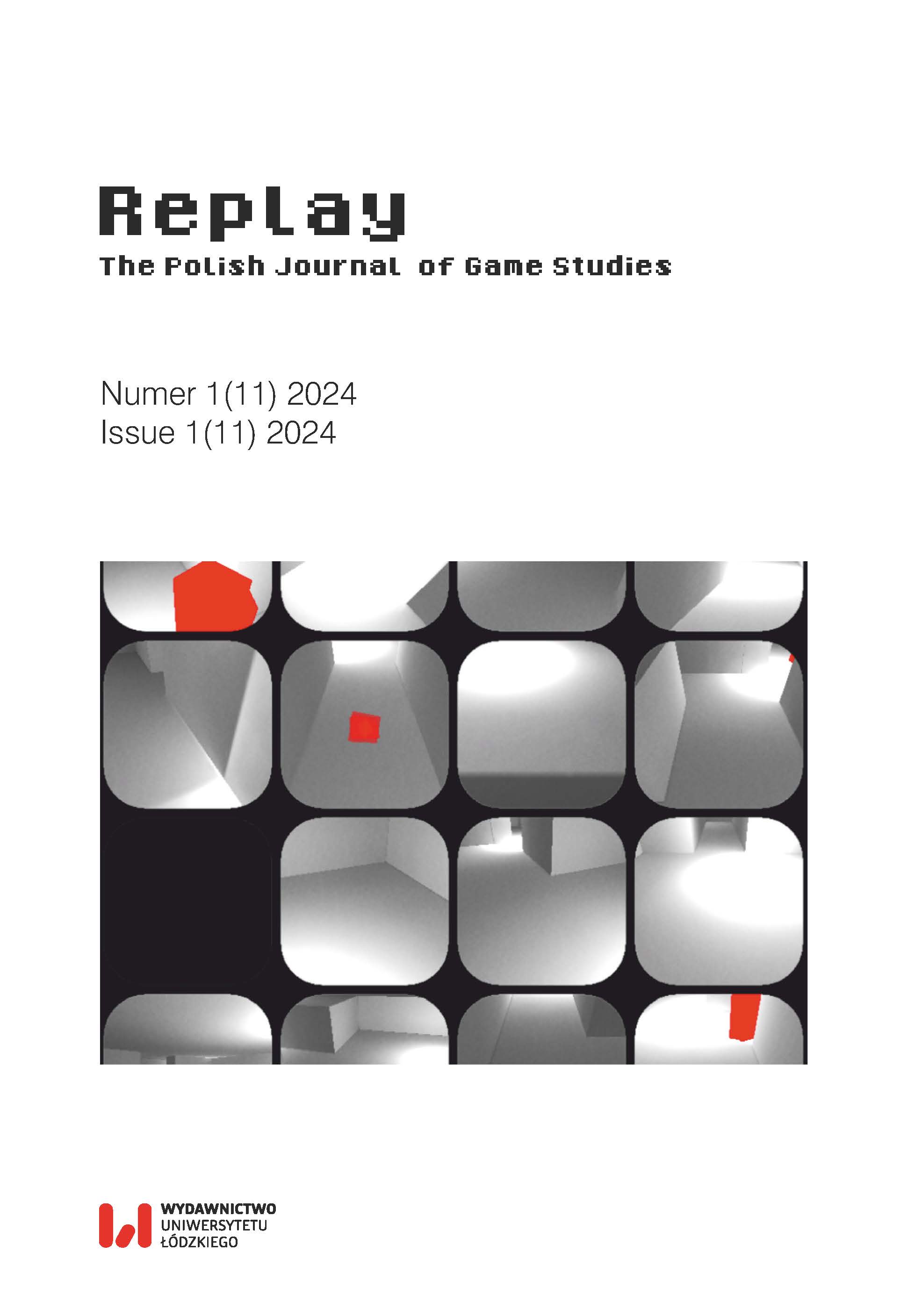Negotiating Anthropocentrism and Ecologies in Cozy Games
DOI:
https://doi.org/10.18778/2391-8551.11.09Słowa kluczowe:
cozy games, ecocriticism, extractivism, 'Animal Crossing: New Horizons', 'Terra Nil'Abstrakt
As we sit at the precipice of this planet’s sixth mass extinction event, we need to use every tool at our disposal to advocate for our ecologies. Human self-interest and anthropocentric thinking act as barriers to communicating ecocrisis. Cozy video games can create safe spaces to explore the ecological effects of human actions with the aim of prompting reflection and action on environmental issues. Drawing on ecocritical video game scholarship, the aim of this article is to explore the ways in which environments are represented and interacted with in selected cozy video games. Through an examination of the extractivist colonial processes and narratives of Animal Crossing: New Horizons, in contrast with the complex ecocritical coziness of Terra Nil, this article posits that cozy games have the potential to achieve effective environmental communication. Both Animal Crossing: New Horizons and Terra Nil successfully empower the player to shape their environment but only Terra Nil affords ecological empowerment. By creating a safe space to engage with environments and even ecocrisis, cozy games allow players the agency to construct their own econarratives and may challenge or perpetuate anthropocentric ideas about the environment.
Bibliografia
Acosta, A. (2013). Extractivism and Neoextractivism: Two Sides of the Same Curse. In: M. Lang & D. Mokrani (Eds.), Beyond Development: Alternative Visions from Latin America (pp. 61–86). Transnational Institute and Rosa Luxemburg Foundation.
Google Scholar
Bogost, I. (2008). The Rhetoric of Video Games. In: K.S. Tekinbaş (Ed.), The Ecology of Games: Connecting Youth, Games, and Learning (pp. 117–140). MIT Press.
Google Scholar
Bohunicky, K.M. (2014). Ecocomposition: Writing Ecologies in Digital Games. Green Letters, 18(3): 221–235. https://doi.org/10.1080/14688417.2014.964283
Google Scholar
DOI: https://doi.org/10.1080/14688417.2014.964283
Chang, A.Y. (2019). Playing Nature: Ecology in Video Games. University of Minnesota Press.
Google Scholar
DOI: https://doi.org/10.5749/j.ctvthhd94
Coffey, Y., Bhullar, N., Durkin, J., Islam, M.S., & Usher, K. (2021). Understanding Eco-Anxiety: A Systematic Scoping Review of Current Literature and Identified Knowledge Gaps. The Journal of Climate Change and Health, 3. https://doi.org/10.1016/j.joclim.2021.100047
Google Scholar
DOI: https://doi.org/10.1016/j.joclim.2021.100047
Condis, M. (2020). Sorry, Wrong Apocalypse: Horizon Zero Dawn, Heaven’s Vault, and the Ecocritical Videogame. Game Studies, 20(3).
Google Scholar
Coroller, S. & Flinois, C. (2023). Video Games as a Tool for Ecological Learning: The Case of Animal Crossing. Ecosphere, 14(3). https://doi.org/10.1002/ecs2.4463
Google Scholar
DOI: https://doi.org/10.1002/ecs2.4463
Crowley, S. (2023). Playing Farmer: At the Intersections of Neo-Liberal Capitalism and Ecocriticism in Stardew Valley. Journal of Gaming & Virtual Worlds, 15(1), 21–37. https://doi.org/10.1386/jgvw_00069_1
Google Scholar
DOI: https://doi.org/10.1386/jgvw_00069_1
Heise, U.K. (2006). The Hitchhiker’s Guide to Ecocriticism. PMLA, 121(2), 503–516.
Google Scholar
DOI: https://doi.org/10.1632/003081206X129684
Heise, U.K. (2019). Imagining Extinction: The Cultural Meanings of Endangered Species. University of Chicago Press.
Google Scholar
Ho, M.-T., Nguyen, T.-H.T., Nguyen, M.-H., La, V.-P., & Vuong, Q.-H. (2022). Good Ethics Cannot Stop Me from Exploiting: The Good and Bad of Anthropocentric Attitudes in a Game Environment. Ambio, 51(11), 2294–2307. https://doi.org/10.1007/s13280-022-01742-y
Google Scholar
DOI: https://doi.org/10.1007/s13280-022-01742-y
Huggan, G. & Tiffin, H. (2015). Postcolonial Ecocriticism: Literature, Animals, Environment. Routledge.
Google Scholar
DOI: https://doi.org/10.4324/9781315768342
Moser, S.C. (2010). Communicating Climate Change: History, Challenges, Process and Future Directions. Wiley Interdisciplinary Reviews: Climate Change, 1(1), 31–53. https://doi.org/10.1002/wcc.11
Google Scholar
DOI: https://doi.org/10.1002/wcc.11
Navarro-Remesal, V. (2019). Pixelated Nature: Ecocriticism, Animals, Moral Consideration, and Degrowth in Videogames. Logos, 26(2), 13–26. https://doi.org/10.12957/logos.2019.46108
Google Scholar
Nixon, R. (2011). Slow Violence and the Environmentalism of the Poor. Harvard University Press.
Google Scholar
DOI: https://doi.org/10.4159/harvard.9780674061194
Short, T.X., Ordon, A., Hurd, D., Howe, C., Forbes, J., Eiserloh, S., Diaz, J., Cook, D., & Meiners, R. (2018, January 24). Cozy Games. Lostgarden. Online: https://lostgarden.home.blog/2018/01/24/cozy-games/ (accessed on March 3, 2024).
Google Scholar
Van Ooijen, E. (2018). The Killability of Fish in The Sims 3: Pets and Stardew Valley. The Computer Games Journal, 7(3), 173–180. https://doi.org/10.1007/s40869-018-0055-x
Google Scholar
DOI: https://doi.org/10.1007/s40869-018-0055-x
Waszkiewicz, A. & Bakun, M. (2020). Towards the Aesthetics of Cozy Video Games. Journal of Gaming & Virtual Worlds, 12(3), 225–240. https://doi.org/10.1386/jgvw_00017_1
Google Scholar
DOI: https://doi.org/10.1386/jgvw_00017_1
Concerned Ape. (2016). Stardew Valley. Concerned Ape.
Google Scholar
DU&I. (2020). Casts Organized Neatly. DU&I.
Google Scholar
Free Lives. (2023). Terra Nil. Devolver Digital.
Google Scholar
Nintendo. (2020). Animal Crossing: New Horizons. Nintendo.
Google Scholar
Witch Beam. (2021). Unpacking. Humble Bundle.
Google Scholar
Pobrania
Opublikowane
Jak cytować
Numer
Dział
Licencja

Utwór dostępny jest na licencji Creative Commons Uznanie autorstwa – Użycie niekomercyjne – Bez utworów zależnych 4.0 Międzynarodowe.










